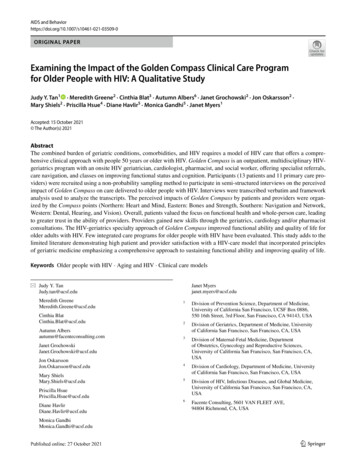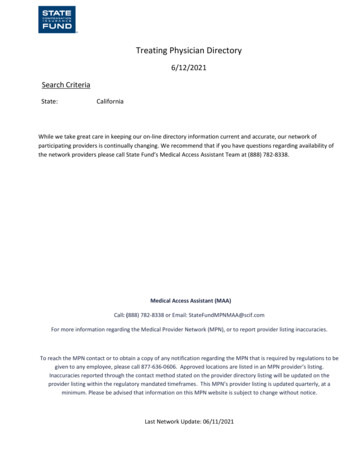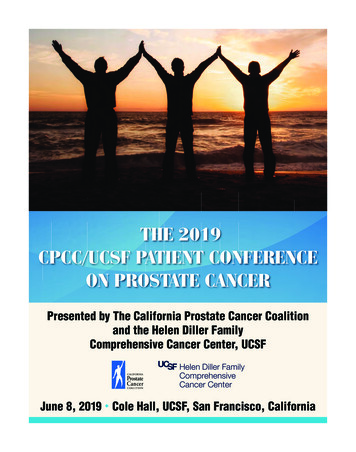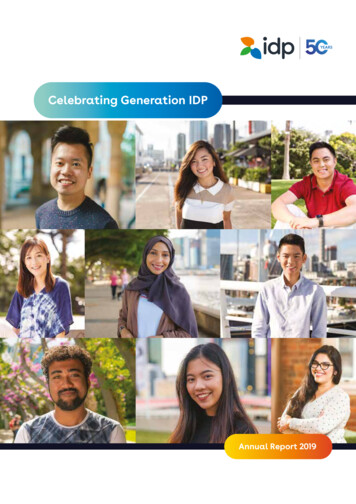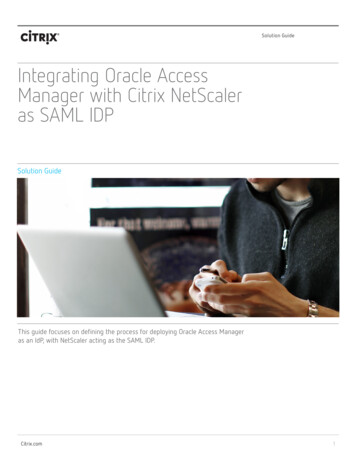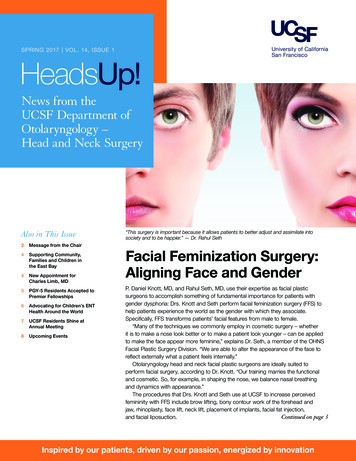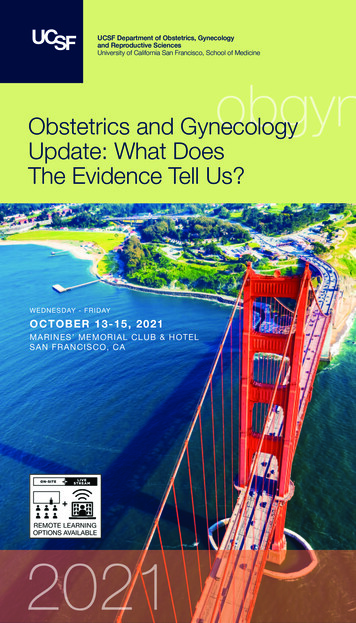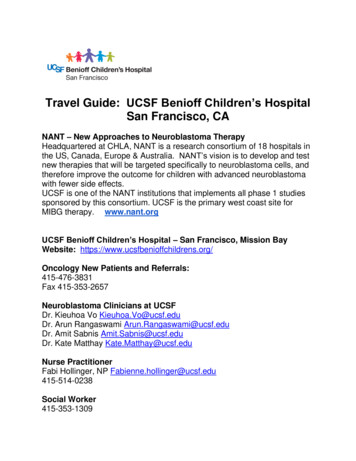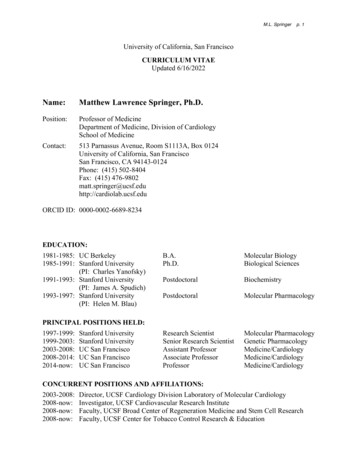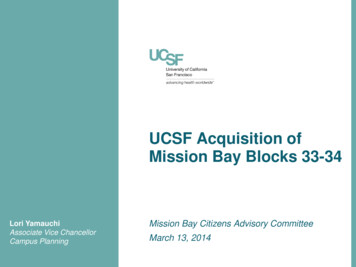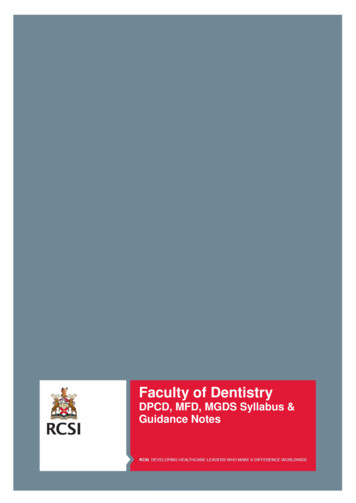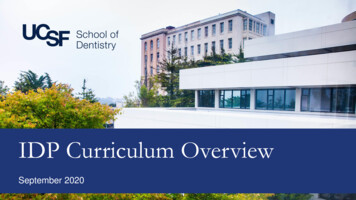
Transcription
IDP Curriculum OverviewSeptember 2020
This presentation covers: Program structureBiomedical sciences coursesDental sciences coursesPreventative and restorative dentalsciences courses Patient centered care courses Clinical rotations Electives
Program Structure IDP pathway is divided into two years(ID3-ID4 years) and operationalizedon an academic quarter system. Students begin in the Summerquarter and complete four quarters ofstudy (Summer, Fall, Winter, Spring) inthe first year. ID4 year is also divided into fourquarters of study.
Our curriculum is comprisedof 5 streams
1. Biomedical Sciences
The Biomedical Sciences (BMS) streamincorporates the basic sciencedisciplines that form the coreknowledge for understanding humanhealth and disease.It includes a course providing scientificbackground on oral pathology that leadto understanding diseases and theirdiagnostic significance in dentistry.BMS course accounts for 2% of programcredit for the IDP pathway.
Biomedical SciencesYear GroupCourse #Course TitleCourse DirectorUnitsQuarter(s)D2; IDP3BMS 127Oral PathologyJordan2WinterFor a full list of courses n/predoctoral-dental-curriculum/idp-curriculum
2. Dental Sciences
The Dental Sciences (DentSci) stream includesspecifically oral-related disciplines. Studentsmaster the knowledge needed for dentaldiagnoses, understanding the development ofdental tissues, and learning the occurrences andprogression of dental diseases.The stream emphasizes the application of scientificunderstanding to dental problems.DentSci courses account for 3% of program creditfor the two-year IDP pathway.
Dental SciencesYear GroupCourse #D2; IDP3Dent Sci 125D1; IDP3Dent Sci 129Course TitleCourse DirectorFundamentals of RiskAssessment, Therapy, Ryderand Prevention IIntroduction toHughesDentistryUnitsQuarter(s)2Fall2.5Fall; SpringFor a full list of courses n/predoctoral-dental-curriculum/idp-curriculum
The Scientific Methods in Clinical Dentistry (SciMeth)stream provides reasoning tools to students in anorganized fashion so that they understand research and itssignificance to practice. Students learn skills to analyzeand solve problems related to the practice of dentistry.It includes developing the ability to explore the dentalliterature, analyze evidence and apply new knowledge sothat graduates are equipped to grow with the changinglandscape of the profession over their working lives.The information presented in this stream is reinforcedthroughout the curriculum via case-based learningstrategies. SciMeth course accounts for 2% of programcredit for the two-year IDP pathway.
Scientific MethodsYear GroupCourse #Course TitleCourse DirectorUnitsQuarter(s)D1; IDP3Sci Meth 117Foundations ofScientific InquiryChaffee2FallFor a full list of courses n/predoctoral-dental-curriculum/idp-curriculum
4. Preventive & Restorative DentalSciences
The Preventive and Restorative Dentistry(PRDS) stream incorporates preclinical coursesin a seamless presentation of material in orderto develop the skills necessary to provide thehighest quality of dental care.The stream makes use of the high-techlaboratory learning environment wherestudents treat simulated patients who presentwith a variety of treatment needs.PRDS courses account for 13% of programcredit for the two-year IDP pathway.
Preventive and Restorative Dental SciencesYear GroupCourse #Course TitleIDP3IDP3DirectorUnitsQuarter(s)PRDS 106Removable & FixedProsthodontics, Restorative Abed& Endodontics15SummerPRDS 104Introductory BiomaterialsScience2FallHabelitzFor a full list of courses please visit our Admissions tion/predoctoral-dental-curriculum/idp-curriculum
5. Patient Centered Care
The Patient Centered Care (PCC) stream begins the clinical education by providingsimple treatment under close faculty support and supervision. Gradually thestudents are supported and guided to take on more complex tasks, and developtheir clinical reasoning and independence treating the diverse patients, from acrossall stages of life, who come to the UCSF SOD Dental Center at Buchanan Street.PCC courses account for 80% of program creditfor the two-year IDP pathway.
Patient-Centered CareYear GroupCourse #IDP3PCC 113IDP4PCC 114D3; IDP3PCC 131D3; IDP3PCC 132D3; IDP3PCC 133D3; IDP3PCC 134IDP3PCC 139BD4; IDP4PCC 146IDP4PCC 149DCourse TitleCourse DirectorPrinciples ofInterprofessionalHydePractice IPrinciple ofInterprofessionalHydePractice IIFoundations in GeneralAnderson-LinDentistry IFoundations in GeneralAnderson-LinDentistry IIFoundations in GeneralAnderson-LinDentistry IIIFoundations in GeneralAnderson-LinDentistry IVComprehensive AdultSinghGeneral Dentistry IAdvanced GeneralNguyenDentistryComprehensive AdultSinghGeneral Densitry IIUnitsQuarter(s)0.5Fall, Winter, Spring*0.5Fall, Summer, Fall, Winter,Spring*Summer, Fall, Winter,Spring*Summer, Fall, WinterSpring*For a full list of courses n/predoctoral-dental-curriculum/idp-curriculum
Practice TeamsStudents are assigned to apractice team where they workclosely with faculty and staff toprovide the highest quality ofcare to our patients.Students get to work with andlearn from their upperclassmen.
SOD curriculum streams and courses facilitate an integrated curriculumthat provides students with sufficient opportunity and experience todevelop and gain competence in all areas that UCSF SOD has defined asrelevant to the practice of general dentistry:“A general dentist is an oral health care provider who canevaluate, diagnose, prevent, and treat diseases and conditions ofthe oral cavity. A UCSF School of Dentistry graduate is a noviceprovider who is able to provide safe and effective treatment to theextent of their training and has the judgment to know when torefer”.
Clinical Rotations
Clinical RotationsRotations include all specialtiesof dentistry: hodonticsOral & Maxillofacial SurgeryOral medicine
Electives
Electives Students are encouraged to take fulladvantage of elective study opportunities When it comes to graduation and writingyour Dean’s Letter of Recommendationelectives are an important way for you totell YOUR dental story Some are interprofessional and studied bydental, medical, pharmacy, and nursingstudents Electives are formal study - i.e. requireacademic credit and are shown on yourtranscript
Thank you for viewing this presentation. If you have any questions about the curriculum,please contact the Learner Success CenterE: sod.learnersuccess@ucsf.edu
*UCSF SOD has a robust education quality assurance system and all information containedin this presentation is subject to development and change.
master the knowledge needed for dental diagnoses, understanding the development of dental tissues, and learning the occurrences and progression of dental diseases. The stream emphasizes the application of scientific understanding to dental problems. DentSci courses account for 3% of program credit for the two-year IDP pathway.
